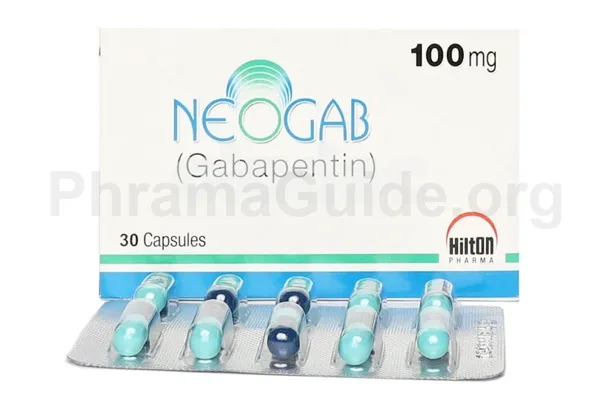Neogab is a medication primarily used to manage seizures and nerve pain (neuropathic pain). Neogab can have various side effects, some of which are more common than others. It’s important to note that not everyone experiences these side effects, and their severity can vary from person to person health conditions. Some common and less common side effects associated with Neogab can include.
Common Side Effects
- Dizziness and Drowsiness: One of the most common side effects is dizziness, often accompanied by drowsiness or fatigue. This effect may be more pronounced when starting Neogab or with dosage increases.
- Coordination Problems: Some individuals might experience difficulties with coordination or balance, leading to clumsiness or an unsteady gait.
- Fatigue: Neogab can cause general tiredness or feelings of lethargy, particularly at higher doses or when first starting the medication.
- Peripheral Edema: Swelling in the extremities, such as the legs or arms, is reported in some cases.
- Weight Gain: A potential side effect observed in some individuals is weight gain.
- Nausea and Vomiting: Some people may experience mild gastrointestinal disturbances such as nausea or vomiting.
- Dry Mouth or Xerostomia: A dry sensation in the mouth can occur as a side effect.
- Mood Changes: In some cases, individuals may experience changes in mood, such as irritability or agitation.
- Memory and Concentration Issues: Some people report difficulty concentrating or memory problems while taking Neogab.
- Rashes: Skin reactions, including rashes or hives, are rare but possible side effects.
- Respiratory Problems: In rare instances, Neogab might cause respiratory issues such as shortness of breath.
Less Common Side Effects
- Mood Changes or Behavioral Effects: In some cases, individuals may experience more severe mood changes, such as depression, anxiety, or even thoughts of self-harm or suicide. These are less common but should be monitored closely, especially when starting the medication.
- Tremors or Shaking: Some individuals might experience tremors or uncontrollable shaking, particularly in the hands or fingers.
- Speech Problems: A less common side effect is speech difficulties, such as slurred speech or difficulty articulating words.
- Kidney Issues: Rarely, Neogab can cause kidney-related problems such as decreased kidney function or inflammation of the kidneys (nephritis).
- Changes in Blood Sugar Levels: There have been reports of Neogab affecting blood sugar levels, leading to increased or decreased levels, particularly in individuals with diabetes.
- Hypersensitivity Reactions: Although rare, some individuals may develop allergic reactions to Neogab, presenting as skin rashes, itching, swelling of the face or throat, and difficulty breathing (anaphylaxis).
- Hormonal Changes: In rare cases, Neogab has been associated with hormonal imbalances, leading to changes in menstrual periods.
- Vision Changes: Along with double vision or blurred vision, some individuals might experience other visual disturbances like involuntary eye movements (nystagmus) or changes in visual acuity.
- Liver Problems: There have been rare reports of liver-related issues, such as hepatitis or elevated liver enzymes.
- Cardiovascular Effects: While uncommon, some individuals may experience changes in heart rate or blood pressure while taking Neogab.

What is Neogab?
Neogab is one of the leading brands of Gabapentin, manufactured and marketed by Hilton Pharmaceuticals (Pvt) Ltd, Pakistan.
Neogab : Available Formulations and Strengths
Presently, Neogab is available in Capsule Form with the following strengths.
Neogab Capsules : 100mg, 300mg, and 400mg strengths
What Are The Possible Drug Interactions of Neogab?
- Antacids Containing Aluminum or Magnesium: Taking Neogab with antacids that contain aluminum or magnesium can reduce the absorption of Neogab, decreasing its effectiveness. It’s advisable to space the doses of Neogab and antacids apart.
- Opioids and CNS Depressants: Combining Neogab with opioids or other central nervous system (CNS) depressants, such as benzodiazepines or alcohol, can enhance the sedative effects and increase the risk of drowsiness, dizziness, respiratory depression, and even coma. This combination should be used cautiously and under close medical supervision.
- Medications that Affect Renal Function: Neogab is primarily eliminated by the kidneys, so medications that affect renal function can impact the clearance of Neogab. Drugs that affect renal clearance, like certain diuretics or nonsteroidal anti-inflammatory drugs (NSAIDs), might require dosage adjustments or close monitoring when used concomitantly with Neogab.
- Naproxen: Concurrent use of naproxen, an NSAID, with Neogab, may lead to an increase in Gabapentin levels in the blood, potentially increasing the risk of Neogab-related side effects.
- Alcohol: Combining Neogab with alcohol can amplify the sedative effects and increase the risk of drowsiness and dizziness.
- Medications affecting the Central Nervous System: Medications that also affect the CNS, such as antidepressants, antipsychotics, or muscle relaxants, can potentiate the CNS depressant effects when used with Neogab, leading to increased drowsiness and dizziness.
- Probenecid: Probenecid, used to treat gout, can reduce the elimination of Neogab, potentially leading to increased Neogab levels in the blood.
- Oral Contraceptives: There’s some evidence suggesting that Neogab might decrease the effectiveness of oral contraceptives. It’s advisable to use alternative or additional contraceptive methods while taking Neogab.

Leave A Comment